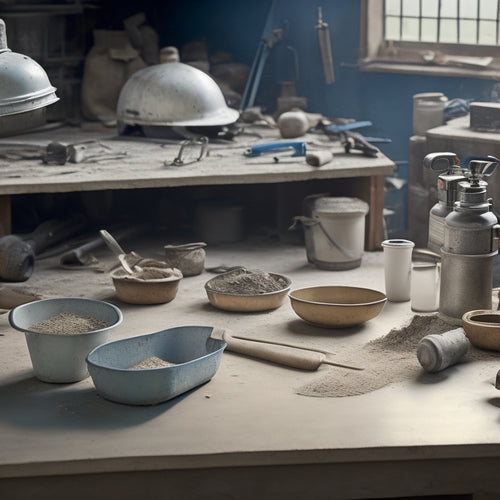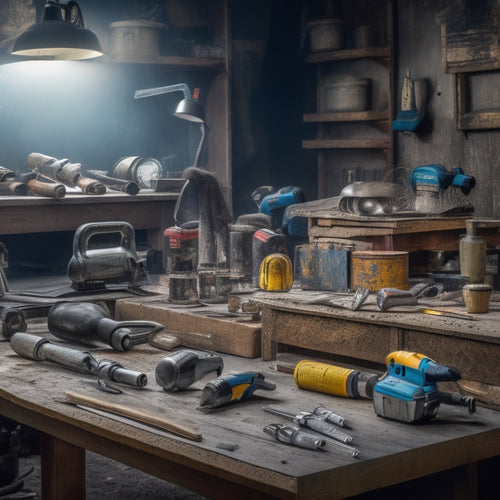
Top 7 Power Tools for Concrete Mixing Success
Share
You're about to discover the top 7 power tools that will take your concrete mixing operations to the next level, ensuring strong, durable, and long-lasting concrete mixes that meet the highest standards. Efficient mixing drill systems, high-torque concrete mixers, and advanced paddle mixing tools top the list, providing the necessary torque and speed for quick material mixing. Heavy-duty mixing buckets, reliable concrete agitator drums, and fast concrete finishing trowels also make the cut, guaranteeing a consistent and uniform mixture. Finally, durable mixing paddle attachments enhance mixing efficiency for heavy concrete mixes. Now, learn more about each of these essential tools.
Key Takeaways
• Efficient mixing drill systems provide necessary torque and speed for quick material mixing and can handle large batches for efficiency.
• High-torque concrete mixers with strong motors and durable gearboxes enable handling of dense mixes without bogging down.
• Advanced paddle mixing tools with enhanced blade designs and reinforced shafts increase mixing speed and performance for high-viscosity concrete mixes.
• Heavy-duty mixing buckets and reliable concrete agitator drums are essential for maintaining uniform consistency and preventing segregation in concrete mixes.
• Fast concrete finishing trowels with advanced ergonomic handles and high-carbon steel blades enable quick and efficient finishing of concrete surfaces.
Efficient Mixing Drill Systems
When tackling concrete mixing projects, you'll rely on efficient mixing drill systems to guarantee thorough blending and uniform consistency. These systems comprise a power drill and a mixing paddle or bit, designed to handle the demands of concrete mixing. You'll have a range of mixing drill types to choose from, including cordless, corded, and pneumatic drills. Each has its advantages, but cordless drills offer greater portability and convenience.
The power drill advantages in concrete mixing are numerous. They provide the necessary torque and speed to break down aggregate and mix materials quickly and efficiently. This results in a uniform consistency, reducing the risk of weak spots and structural defects.
Additionally, power drills can handle large mixing batches, saving you time and effort. With the right mixing drill system, you'll be able to tackle complex concrete mixing projects with confidence, knowing that your mix will be strong, durable, and long-lasting.
High-Torque Concrete Mixers
When selecting a high-torque concrete mixer, you'll want to evaluate the mixer's motor performance, as it directly impacts the machine's ability to handle heavy loads and demanding mixing tasks.
You'll also need to reflect on drum capacity options, as this will influence the mixer's overall productivity and efficiency.
Mixer Motor Performance
How efficiently can a high-torque concrete mixer's motor perform when faced with thick, heavy mixes and demanding job site conditions? You need a mixer that can handle the toughest tasks, and that's where mixer motor performance comes in.
There are two primary mixer motor types: universal motors and induction motors. Universal motors are ideal for small to medium-sized mixers, while induction motors are better suited for larger, more heavy-duty applications.
When selecting a mixer, pay close attention to the motor power ratings. Look for mixers with high motor power ratings, typically measured in horsepower (hp) or kilowatts (kW). A higher power rating guarantees your mixer can handle dense, heavy mixes without bogging down. For example, a 1.5 hp motor can handle smaller batches, while a 5 hp motor can tackle larger, more demanding mixes.
You should also consider the motor's torque output, measured in foot-pounds (ft-lbs). A higher torque output means your mixer can handle thicker, heavier mixes with ease. When you're working with concrete, you need a mixer that can deliver the power and performance you need to get the job done effectively.
Drum Capacity Options
With the right motor performance in place, you can now focus on selecting a high-torque concrete mixer with a drum capacity that matches your specific mixing needs. The drum capacity of your mixer will greatly impact the efficiency and productivity of your concrete mixing operations. When choosing a mixer, you'll need to take into account the type of drum materials, such as steel, polyethylene, or fiberglass, and their corresponding capacity comparisons.
| Drum Material | Capacity Range (cu. ft.) | Benefits |
|---|---|---|
| Steel | 6-12 | Durable, heavy-duty, and resistant to wear and tear |
| Polyethylene | 4-8 | Lightweight, corrosion-resistant, and easy to clean |
| Fiberglass | 3-6 | Non-corrosive, low maintenance, and cost-effective |
Gearbox Durability Matters
As you evaluate high-torque concrete mixers, it's important to scrutinize the gearbox's durability, since a robust gearbox is fundamental for transmitting the motor's power efficiently to the drum. A durable gearbox guarantees that the mixer can handle heavy loads and withstand the rigors of continuous operation.
When appraising gearbox durability, look for high-quality gearbox materials that can resist wear and tear. Steel or cast iron gearboxes are often preferred over aluminum or plastic ones due to their exceptional strength and durability.
Regular gearbox maintenance is also essential to extend its lifespan. Confirm that the gearbox is properly lubricated, and the lubricant is changed regularly to prevent overheating and wear. Additionally, inspect the gearbox for signs of wear, such as worn-out gears or bearings, and replace them promptly.
Advanced Paddle Mixing Tools
You'll find advanced paddle mixing tools boasting enhanced blade designs and reinforced shafts that efficiently tackle high-viscosity concrete mixes. These cutting-edge tools are designed to optimize your mixing process, guaranteeing a uniform and consistent mixture.
Paddle design innovations have led to increased mixing speed optimization, allowing you to complete tasks faster and more efficiently. With advanced paddle mixing tools, you can expect improved mixing performance, reduced fatigue, and increased productivity.
When working with high-viscosity concrete mixes, it's essential to have a tool that can handle the task. Advanced paddle mixing tools feature reinforced shafts that withstand the rigors of heavy mixing, reducing the risk of breakage and downtime.
Additionally, the enhanced blade designs guarantee a more efficient mixing process, saving you time and energy. With advanced paddle mixing tools, you'll be able to tackle even the toughest mixing tasks with confidence and precision.
Heavy-Duty Mixing Buckets
To complement your advanced paddle mixing tools, turn to heavy-duty mixing buckets that can withstand the rigors of high-viscosity concrete mixes and demanding job site conditions.
You need buckets that can handle the intense mixing action and heavy loads without compromising performance or safety. Look for mixing bucket features that prioritize durability, such as reinforced steel or heavy-gauge polyethylene construction, and a robust handle design for secure lifting and pouring.
When selecting a heavy-duty mixing bucket, consider the bucket size options that meet your specific needs. Do you need a smaller 2-3 cu. ft. bucket for tight spaces or a larger 5-6 cu. ft. bucket for high-volume mixing?
Choose a bucket that accommodates your mixer's capacity and your project's requirements. Additionally, guarantee the bucket's interior is smooth and non-stick to prevent concrete from adhering and making cleanup a breeze.
With the right heavy-duty mixing bucket, you'll be able to tackle even the most challenging concrete mixing tasks with confidence and efficiency.
Reliable Concrete Agitator Drums
When mixing concrete, a reliable concrete agitator drum is vital for maintaining uniform consistency and preventing segregation, guaranteeing that your finished product meets specifications. You need a drum that can handle the rigors of heavy-duty concrete mixing techniques, such as high-speed mixing and intense agitation. A good agitator drum should be able to mix concrete to the perfect consistency, without compromising on strength or durability.
Regular agitator drum maintenance is essential to guarantee peak performance. You should regularly inspect the drum for signs of wear and tear, and replace worn-out parts promptly. Cleaning the drum after each use is also important to prevent concrete from hardening and affecting future mixes. By following these maintenance tips, you can extend the life of your agitator drum and guarantee consistent results.
When choosing an agitator drum, look for features such as heavy-duty construction, high-torque motors, and advanced mixing blades. These features will guarantee that your drum can handle the demands of high-volume concrete mixing. With the right agitator drum, you'll be able to produce high-quality concrete that meets specifications and exceeds expectations.
Fast Concrete Finishing Trowels
Equipped with advanced ergonomic handles and high-carbon steel blades, fast concrete finishing trowels enable you to achieve a smooth, even finish on freshly poured concrete surfaces.
These trowels are designed to help you master the art of concrete finishing, allowing you to achieve professional-grade results with ease. By employing expert trowel techniques, you can guarantee a uniform finish, free of imperfections and blemishes.
To get the most out of your fast concrete finishing trowel, follow these finishing tips: maintain a consistent angle, apply even pressure, and work in small, controlled sections.
Additionally, make certain to keep your trowel clean and well-maintained to prevent concrete from accumulating and affecting the finish.
With practice and patience, you'll be able to achieve a flawless, high-gloss finish that exceeds expectations.
Durable Mixing Paddle Attachments
You can greatly upgrade your mixing efficiency by incorporating durable mixing paddle attachments into your power tool arsenal, allowing you to tackle heavy concrete mixes with confidence.
When selecting a mixing paddle attachment, consider the paddle material types, such as high-strength steel, fiberglass, or polyurethane-coated models. Each material has its strengths, with steel offering maximum durability and fiberglass providing a lightweight, corrosion-resistant option.
Choose a mixing paddle size that matches your mixer's capacity and the type of concrete you're working with. Larger paddles (up to 24 inches in diameter) are ideal for high-volume mixing, while smaller paddles (12-18 inches) are better suited for smaller batches and more precise control.
Look for paddles with reinforced ribbing or a spiral design, which improve mixing efficiency and reduce material buildup. Additionally, consider paddles with adjustable or removable blades, allowing you to customize your mixing experience and simplify cleanup.
Frequently Asked Questions
Can I Use a Power Tool for Mixing Small Batches of Concrete?
When you're working with small batch sizes, you're probably wondering if a power tool is suitable for mixing.
The answer is yes, you can definitely use a power tool for mixing small batches of concrete. In fact, it's often more efficient than manual mixing techniques.
With the right tool, you'll achieve a consistent mix, saving you time and effort.
How Do I Maintain and Clean My Concrete Mixing Power Tools?
Like a master chef seasoning their prized utensils, you must prioritize tool maintenance to guarantee your concrete mixing power tools remain in top condition.
Regularly inspect your tools for wear and tear, and employ cleaning techniques such as wire brushing and solvent wiping to remove dried concrete and debris.
Failure to do so can lead to premature wear and compromised mixing performance.
Stay on top of maintenance to maximize your tools' potential and avoid costly downtime.
Are Power Tools for Concrete Mixing Suitable for DIY Projects?
You're wondering if power tools for concrete mixing are suitable for DIY projects.
The answer is yes, you can definitely use them for DIY concrete projects.
In fact, having the right power tools can make all the difference in achieving professional-like results.
With the correct tools, you'll be able to mix, pour, and finish your concrete efficiently and effectively, ensuring a strong and durable outcome.
What Safety Precautions Should I Take When Using Concrete Mixing Tools?
When working with concrete mixing tools, you must prioritize safety.
Consider a scenario where a DIY enthusiast, like you, fails to wear protective gear and ends up with severe skin irritation from cement splashes. To avoid this, focus on developing proper mixing techniques, such as gradually adding water and using a low-speed mixer.
Always wear protective gear, including gloves, goggles, and a mask, to minimize exposure to hazardous materials.
Can I Rent Power Tools for Concrete Mixing Instead of Buying Them?
You're wondering if renting power tools for concrete mixing is a viable option instead of buying them.
It's a smart question! Renting can be a cost-effective solution, especially for infrequent or one-time projects.
Compare the rental costs to buying the tools outright, considering factors like usage frequency and duration.
You'll likely find that power tool rental services offer a more affordable alternative, allowing you to access the tools you need without breaking the bank.
Conclusion
You've got the right mix of power tools to tackle any concrete project.
Now, it's time to 'bring home the bacon' - deliver a high-quality finish that meets your client's expectations.
With these top 7 power tools, you'll be well-equipped to handle even the toughest mixing jobs.
From efficient drill systems to durable mixing paddles, you'll be able to mix, agitate, and finish concrete like a pro.
Related Posts
-

What Tools Do You Need for Concrete Success
For concrete success, you'll need a range of essential power tools, including rotary hammers, angle grinders, concret...
-

10 Best Tools for Sealed Concrete Flooring on Budget
When starting on a sealed concrete flooring project on a budget, you'll need to prioritize essential tools without sa...
-

Essential Power Tools for DIY Concrete Sculpting
As you begin DIY concrete sculpting, you'll need a strategic selection of power tools to achieve professional-grade r...


